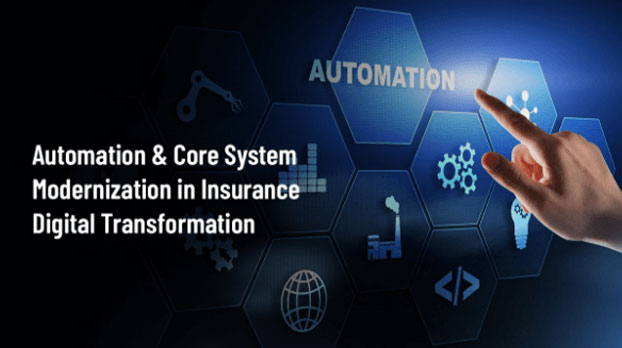The Role of Automation and Core System Modernization in Digital Transformation of Insurance Industry
25th June, 2023

The insurance industry is undergoing a significant transformation driven by digitalization. To stay competitive and meet evolving customer expectations, insurance companies are embracing digital transformation. Automation and core system modernization play vital roles in this journey.
Automation and core system modernization are crucial for the digital transformation of the insurance industry. They streamline processes, reduce manual effort, and improve efficiency.Automating tasks like underwriting, claims processing, and customer service enhances operations, reduces costs, and enhances customer interactions.
Modernizing core systems complements automation efforts by replacing outdated legacy systems. Legacy systems lack the agility and scalability required for digital transformation. Modernization enables integration of new technologies, leverages data insights, and delivers personalized customer experiences. It enhances operational capabilities, data management, and adaptability to changing market needs.
Understanding Digital Transformation in the Insurance Industry
Digital transformation is a comprehensive process that entails the integration of digital technologies across all facets of insurance business operations. In today's dynamic landscape, insurance companies that embrace digital transformation gain a significant competitive edge.
By leveraging digital technologies, such as automation and core system modernization, these companies can deliver personalized services, streamline processes, and make data-driven decisions. Automation enables the automation of manual tasks, reducing human intervention and increasing efficiency.
Meanwhile, core system modernization involves upgrading or replacing legacy systems with modern, agile, and scalable platforms that facilitate seamless integration and efficient data management. Together, automation and core system modernization empower insurance companies to achieve their digital transformation objectives, enabling them to offer tailored services, optimize workflows, and leverage data insights for better decision-making.
The Role of Automation in Insurance Digital Transformation
Automation streamlines processes, reduces manual effort, and enables faster and more accurate operations. By automating underwriting, claims processing, and customer service tasks, insurance companies improve efficiency, reduce costs, and enhance customer interactions. Automation is transforming various areas of the insurance sector, including underwriting, claims processing, and customer service, resulting in faster turnaround times, accurate risk assessments, and personalized customer experiences.
Core System Modernization: Unlocking the Power of Digital Transformation
Legacy systems often hinder digital transformation efforts due to their limited capabilities and inflexibility. Core system modernization involves upgrading or replacing these systems with modern, agile, and scalable platforms. Modernizing core systems enables seamless integration, efficient data management, and enhanced customer experiences. It enhances operational capabilities, data management, and the ability to adapt to changing market needs. Health insurance digital transformation and insurance digital transformation services rely on core system modernization to facilitate efficient operations and improved customer experiences.
The Synergy between Automation and Core System Modernization
Automation and core system modernization go hand in hand in achieving digital transformation in the insurance industry. Automation optimizes processes, improves efficiency, and reduces manual effort. Core system modernization provides the necessary foundation to support automated processes, enabling insurance companies to streamline operations, enhance data analytics capabilities, and deliver superior customer experiences. Successful implementation of automation and core system modernization leads to increased operational efficiency, improved customer satisfaction, and innovation in the insurance sector.
Overcoming Challenges in Automation and Core System Modernization
While the benefits of automation and core system modernization are evident, there are challenges to be addressed. Data security, privacy, and regulatory compliance are paramount concerns that must be addressed throughout the digital transformation journey. Developing a robust digital strategy, implementing effective change management practices, and collaborating with experienced technology partners are essential steps in overcoming these challenges. Leveraging industry best practices and keeping abreast of emerging technologies will also ensure successful automation and core system modernization initiatives.
The Future of Automation and Core System Modernization in Insurance
Automation and core system modernization will continue to shape the insurance industry's future. Advancements in technologies like artificial intelligence, blockchain, and machine learning present even greater opportunities for insurance companies to enhance their digital capabilities. The insurance sector will witness further advancements in personalized customer experiences, advanced data analytics, and streamlined operations. Insurance companies that prioritize insurance company digital transformation will be well-positioned to thrive in the ever-changing digital landscape.
Conclusion
Automation and core system modernization are pivotal in the digital transformation of the insurance industry. By prioritizing health insurance digital transformation, and embracing automation and core system modernization, insurance companies can navigate the digital landscape successfully. These initiatives unlock new possibilities in customer experiences, risk management, and business growth, ensuring insurance companies remain competitive in the ever-changing digital era.
Recent Articles
- How do Big Insurers Engage with the New-Age InsurTech Companies?
- Insurance Management System Integration: Maximizing Efficiency and Performance
- Will Blockchain Technology Reshape the Insurance Market?
- The Future of Health Insurance: Predictive Analytics and AI
- Buy or Build Insurance Software? A Game-Changing Question in Insurance Industry